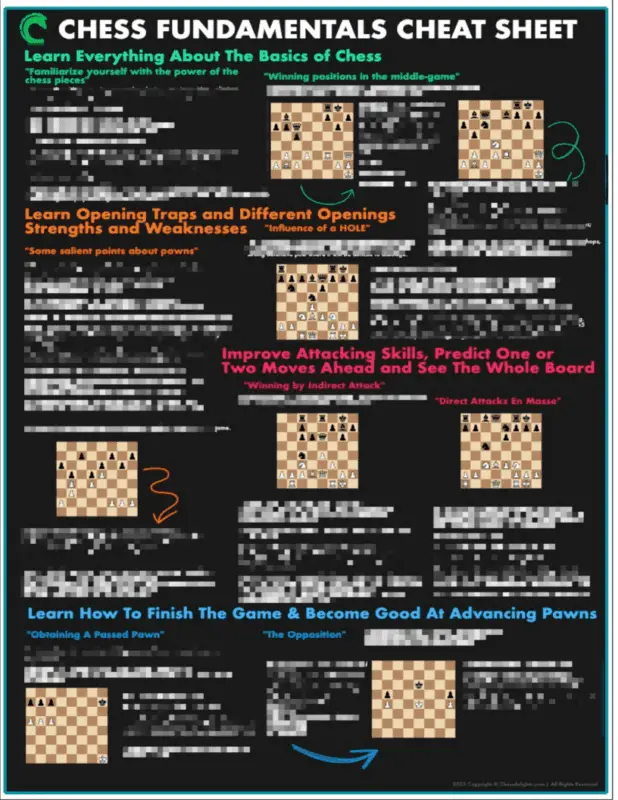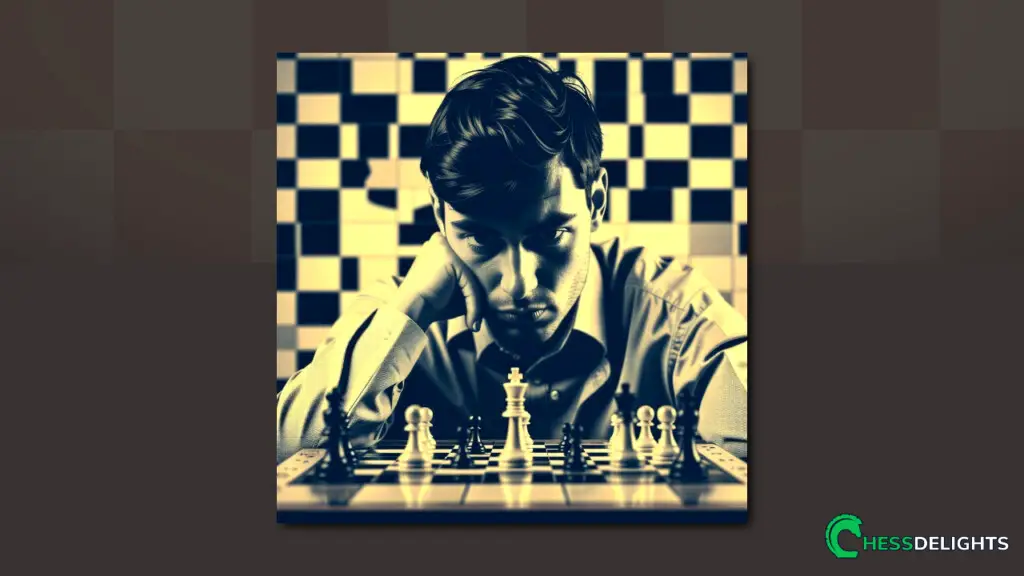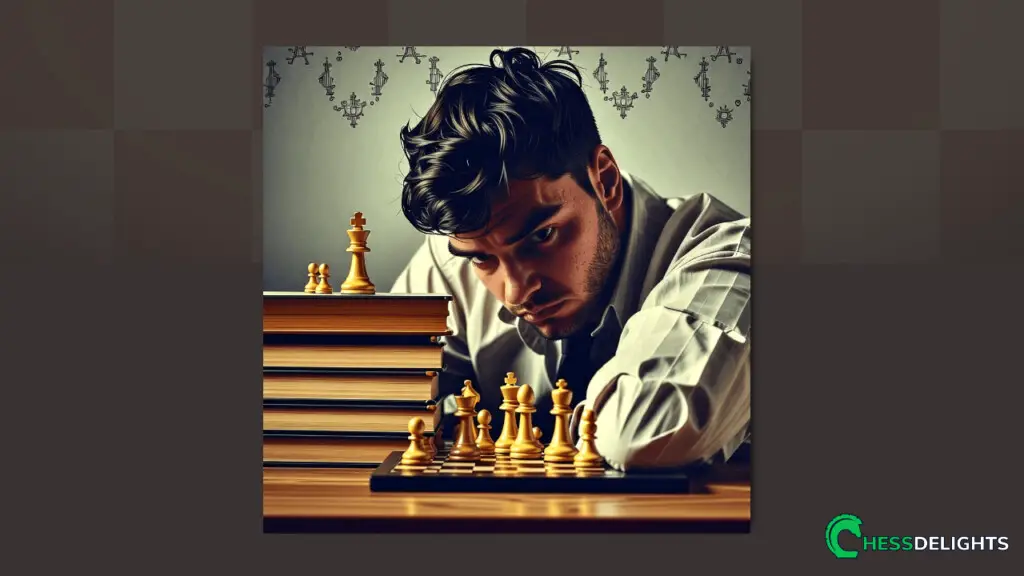Improving your chess skills requires a multi-faceted approach.
First, it's important to learn the rules and basic principles of the game, such as controlling the center, developing pieces, and ensuring the safety of your king.
It's beneficial to study chess tactics and strategies, which you can do through books, online resources or by joining a chess club. Practicing frequently is key, as it helps to reinforce what you've learned; try to play long games as opposed to blitz games, as these will help you to think more deeply and improve your understanding of the game.
Analyzing your games, particularly your losses, can provide valuable insights into your weaknesses and areas for improvement.
Watching grandmaster games can be highly informative; observing their strategies and thought processes can give you a better understanding of high-level play and inspire your own game.
Using chess software and apps can also be beneficial for training, particularly for practicing tactics and endgames.
Improvement requires patience and consistency, so don't be disheartened if progress seems slow. As the saying goes, Rome wasn't built in a day, and neither is a chess master. 🙂
Table of Contents
How Important is Learning Opening Theory for Enhancing Chess Skills
Learning opening theory is fundamentally crucial for enhancing chess skills and this is a lesson I've learned from my own personal experience with the game.
Just as a building needs a solid foundation, so too does a game of chess. The opening phase of the game, typically the first 10-15 moves, is where this foundation is laid.
This is where the player establishes control over key squares, particularly in the center of the board, and begins the process of safely developing their pieces.
Recommended reading: If you want to read more about fundamentals of chess, check out this article.
In my early days of playing chess, I often neglected the importance of opening theory, opting instead to improvise my moves. This, however, often resulted in putting myself at a disadvantage early in the game.
I would lose control of the center, find my pieces poorly developed, and would often fall into traps set by my opponents who were well-versed in opening theory.
By studying and understanding opening theory, I found that I could avoid these early mistakes and set myself up for a stronger middlegame. It allowed me to understand the motivations behind certain opening moves and to anticipate common responses.
This knowledge often gave me a significant advantage over opponents who were less familiar with opening theory.
How Can Studying Endgames Improve My Chess Skills
From my experience, studying endgames is an incredibly effective way to improve your chess skills. The endgame, where only a few pieces are left on the board, often determines the outcome of the game.
It's a phase of the game that requires precise calculation, strategic planning, and a deep understanding of piece coordination.
In my own games, I've often found myself in positions where I had a slight advantage going into the endgame, but due to a lack of understanding and experience, I was unable to convert these advantages into wins.
This highlighted the necessity of endgame study.
Recommended reading: If you want to read more about best way to learn chess, check out this article.
By learning common endgame patterns and techniques, I was able not only to improve my endgame play but also my overall understanding of the game.
Endgames can appear simple due to the reduced material, but they hide a complexity that requires careful study.
They teach the value of each piece, the importance of king activity, and the power of pawn structure.
These lessons are not only beneficial in the endgame but also carry over into the middlegame and even the opening.
What Role Does Learning Strategy Play in Improving My Chess Skills?
Learning strategy plays another pivotal role in improving chess skills.
Chess, at its core, is a strategic battle, a mental war where each player tries to outwit the other.
From my own experiences, understanding different strategies and when to employ them has been instrumental in improving my game.
I often focused solely on tactical play, looking for quick calculations and short-term advantages. While this was occasionally effective, it often left me directionless once the tactics ran out.
I realized that I needed to understand broader strategic principles to guide my game.
Recommended reading: If you want to read more about how chess improves your creativity, check out this article.
Studying different strategies, such as controlling the center, piece development, pawn structure, and king safety, provided me with a framework to guide my decisions.
Each move had a purpose in the larger plan, and I could react to my opponent's moves with clear intent.
This strategic understanding significantly improved my understanding of the game and increased my winning chances. Moreover, it made the game more enjoyable as I could appreciate the deeper intricacies of chess.
How Can Studying Famous Chess Games Help
Studying famous chess games is another highly beneficial way to improve your skills in chess. These games usually demonstrate top-level strategies, tactics, and endgame techniques executed by the world's best players.
Based on my experienced, they offer a wealth of learning opportunity. I sometimes spend a lot of time analyzing these games, trying to understand the thought process behind every move.
From these studies, I have gained insights into successful strategies and tactics, comprehended common errors that I should avoid, and learnt how to exploit the mistakes of my opponents.
Furthermore, these games have also helped me develop the ability to anticipate my opponent's moves, which is a key skill in chess.
Recommended reading: If you want to read more about how chess can help sharpen your mind, check out this article.
Should I Focus on Tactical Training to Improve My Chess Skills
Tactical training is indeed a crucial aspect of improving your chess skills. Tactics are primarily about short-term attacks and defenses that can offer immediate gains.
I remember when I first started focusing on tactical training, my understanding of the game improved dramatically. I was able to identify opportunities for forks, pins, skewers, and other maneuvers that put me in control of the game.
It's not to say that a strategic understanding isn't important, but I have noticed that many games, especially at the amateur level, are decided based on tactical prowess.
What are Some Recommended Books or Resources for Learning Chess?
If you're looking to enhance your chess skills, there are plenty of books and resources available. From my personal book collection, I can highly recommend “Bobby Fischer Teaches Chess“ for beginners. This book breaks down the game into simple, understandable parts.
For intermediate players, “My System“ by Aron Nimzowitsch is a great resource. It offers a deep dive into various chess strategies and tactics.
For advanced players, nothing beats “Dvoretsky's Endgame Manual“. This book is a comprehensive guide to the complex endgame phase of chess.
Also, there are several online platforms that offer interactive learning experiences.
I have personally benefited a lot from Chess.com and ChessMood.com. They offer interactive lessons, puzzles to sharpen your skills, and the opportunity to compete against players from all over the world.
How Can Playing Against Stronger Opponents Help Improve My Chess Skills?
Playing against stronger opponents is a critical aspect of improving your chess skills, something I've found to be true in my own experience. When I've played against more skilled opponents, I was forced to step out of my comfort zone and push my boundaries.
This was because stronger players were able to exploit my weaknesses, highlighting areas of my game that needed improvement.
It's like studying with the smartest student in your class – they are likely to have insights and methods of problem-solving that you might not have considered otherwise. I found that by observing their strategies and techniques, I was able to add new elements to my own game.
While losing to a stronger opponent can be disheartening, it's important to remember that each loss offers a valuable learning opportunity.
How Important is Learning From Losses in Chess?
Learning from your losses in chess is incredibly important. In the games that I've lost, I've found those to be the most instructive in terms of identifying my weaknesses and understanding where I need to improve. When you lose a game, it's an opportunity to go back and analyze what went wrong.
In my experience, I've found that it's important to review these games critically, identifying key mistakes in my strategy and tactics. This has allowed me to develop better plans for similar situations in the future.
It's essentially like receiving feedback on a project or assignment – while it can be difficult to hear, it's invaluable in terms of learning and growth.
What Role Does Regular Practice Play in Improving Chess Skills?
Much like any other skill or discipline, regular practice is paramount in improving your chess skills.
I've found that consistent practice has been key in memorizing different strategies and tactics, which has in turn improved my decision-making speed – a crucial factor in timed games.
I've noticed that the more I practice, the more I develop my chess intuition. This means that I start to “feel” the right move based on past encounters. Practice also boosts confidence, as the familiarity with the game and its intricacies reduces anxiety and uncertainty.
Recommended reading: If you want to read more about ways to improve your memory to help improve your chess game, check out this article.
How Can Chess Puzzles and Exercises Help
Chess puzzles and exercises are like the drills in a basketball practice – they focus on specific scenarios that help to enhance your overall game.
In my experience, I've found that they challenge me to apply my knowledge in various situations, acting as a practical test of my understanding of strategy and tactics. These puzzles often concentrate on particular themes or patterns, so they're excellent for reinforcing these concepts.
For example, a puzzle might focus on a specific checkmate pattern, helping me recognize and execute that pattern more easily in a real game.
I consider these exercises the homework of chess – they might seem tedious at times, but they're essential in grasping and applying complex concepts.
Should I Use Chess Software or Online Platforms to Improve My Skills
Using chess software or online platforms has greatly aided me in honing my chess skills up to now. They come equipped with a myriad of resources such as interactive lessons, puzzles, and the capability to play against both human and computer opponents of varying skill levels.
These platforms have also been essential in helping me analyze my games. I've been able to identify my mistakes and study them, which has been invaluable in my journey towards improvement. For example, I once used chess software to replay a game I lost.
The software allowed me to visualize where I made a wrong move that led to my defeat, and I was able to learn from this mistake. Thus, I would definitely recommend using these resources to anyone looking to advance their chess skills.
How Can a Chess Coach or Mentor Help Me Improve My Skills?
Having a chess coach or mentor can be instrumental in improving your chess skills. The coaches or mentor are usually seasoned players who possess an in-depth understanding of the strategies, tactics, and nuances of the game.
They can offer invaluable insights that are derived from their extensive knowledge and experience.
For example, my mentor is my dad and he was able to pinpoint my strengths and weaknesses, which allowed him to customize a training plan that focused on my areas for improvement.
He also helped me understand complex concepts, correct my mistakes, and taught me advanced strategies. Beyond this, having a mentor motivated me, boosted my confidence, and guided me through the mental aspects of the game.
I am a firm believer in the significant improvements one can experience in their chess performance through regular lessons and practice games with a coach.
What is the Importance of Physical Fitness and Mental Focus in Improving Chess Skills?
Physical fitness and mental focus have played a crucial role in my chess improvement. Though chess is primarily a mental game, maintaining good physical health is key in enhancing cognitive abilities, leading to better game performance.
Regular physical exercise has helped me improve my concentration, memory, and cognitive flexibility.
When I started incorporating physical exercise into my daily routine, I noticed an improvement in my ability to think clearly, make better decisions, and stay focused during long games.
On the other hand, mental focus is directly related to chess performance.
Recommended reading: If you want to read more about relations of memory and mental health, check out this article.
Chess requires a great deal of concentration, strategic thinking, and mental stamina.
For example, I had to learn how to anticipate my opponent's moves, remember past games, and make complex decisions under pressure.
You can train your mind to stay focused and sharp through various techniques like meditation, brain training exercises, and playing practice games.
For my own journey, I have found that a combination of physical fitness and mental focus can significantly boost chess abilities.
Complete Guides: If you want to learn more check out our complete effective learning strategies guides resource page.







